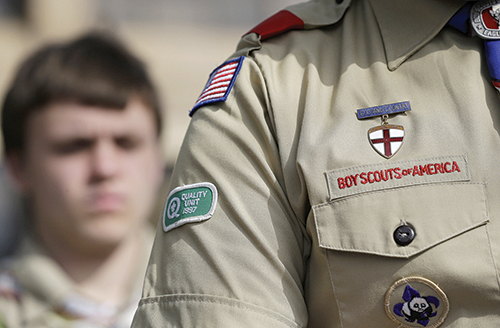
May is always an interesting month. May 1 marks International Workers’ Day, May 5 is Cinco de Mayo, and now May 20 might begin to mark something interesting as well.
Late last month, the Boy Scouts of America announced that the organization will soon be voting on whether it will allow gay youth to become members. The announcement was made on April 19 to mixed feedback.
The proposal originally included a lift on the ban against gay scoutmasters and older members, but “conservatives and religious groups objected,” according to The Huffington Post. The initial proposal was definitely a step in the right direction. According to the article, Herndon Graddick, the president of the Gay and Lesbian Alliance Against Defamation, stated that the change in BSA’s policy could “only strengthen its core principles of fairness and respect.”
And people all over the U.S. are rallying behind the change in policy.
Dave and Joe McGrath, a father-son duo, are willing to bike 1,800 miles “from their Idaho Falls home to the BSA headquarters in Irving, Texas, where they will present scouting officials with their objections to the anti-gay policy,” HuffPost reported.
Dave, who has served in the army, told an Idaho-based news station that many of his family members are gay and involved with the Boy and Eagle Scouts. He stated, “I wish [the BSA] all the best, and yet they discriminate against the people I love.”
The fact that the organization is making this decision based on concern and the need to include queer youth is comforting. With many states rallying to legalize gay marriage, it’s easy to forget that there are other issues present in the lesbian, gay, bisexual, transgender and queer community. Queer youth need inclusion, and exclusion from something ingrained in American culture like the Boy Scouts can be very traumatic for youth.
As expected, there are many counterarguments to this proposal. Some are actually based in logic rather than solely in religious belief. Paul Bedard of The Washington Examiner brought up the fact that the BSA gets a huge amount of funding from “church-based troops.” These troops are threatening to leave if the proposal is passed, but in all honesty the BSA has been around for a good long while.
I really don’t think it’ll be going away just because some troops stuck in the Old Testament are angry.
Bedard also pointed out that the “potential for sexual harassment and bullying could lead to massive legal fees.” That claim is—excuse me—utter bullshit. It plays into non-inclusive, close-minded stereotypes and stigmas that do nothing to fuel any form of all-inclusive community (or, as feminist writer bell hooks would say, a “beloved community”).
The BSA’s use of the phrase “sexual preference,” Bedard said, could “be used by LGBT activists to push for transgendered girls in the BSA.”
Oh, yeah, because that’s what we really need to be afraid of. The biggest threat to American culture is definitely the idea that queer youth could be joining the Boy Scouts. Puh-leaze.
Religious groups make up the majority of the opposition, but some opposition also comes from left-leaning individuals. Many self-identified gay individuals have made it clear that they find the proposal prejudiced as it excludes older Eagle Scouts and scoutmasters.
An NBC news affiliate quoted Jeffrey Stevens, who identifies as gay, as saying, “It’s really prejudice…There’s this hidden assumption that grown gay men are going to molest children.”
Tag onto this the depressing fact that only around 5 percent of BSA members earn the title of Eagle Scout.
On May 20, the BSA will vote. If the policy change is approved, it will take effect on January 1, 2014.
Despite the opposition, this would be a small step in the right direction. If the BSA begins allowing queer youth to become members, it’s only a matter of time before queer adults are allowed to join as well.
However, there should be no “allowed” to begin with. The BSA should have granted admission to anyone who wanted to be a part of the organization. Communities aren’t built on hatred and prejudice. They are cultivated through love, acceptance and inclusion.
If we’re to keep moving along the path to a better world, these are the kinds of things we need to be thinking about.

